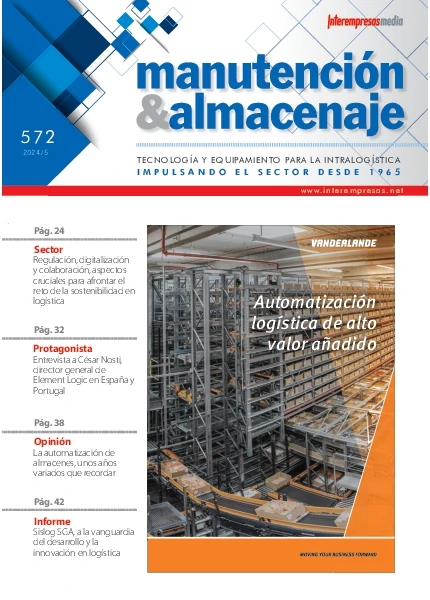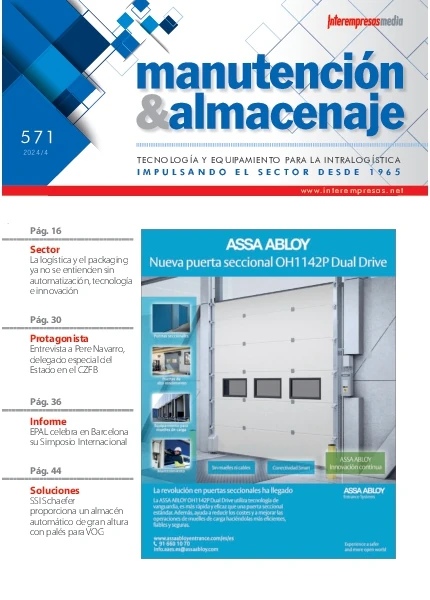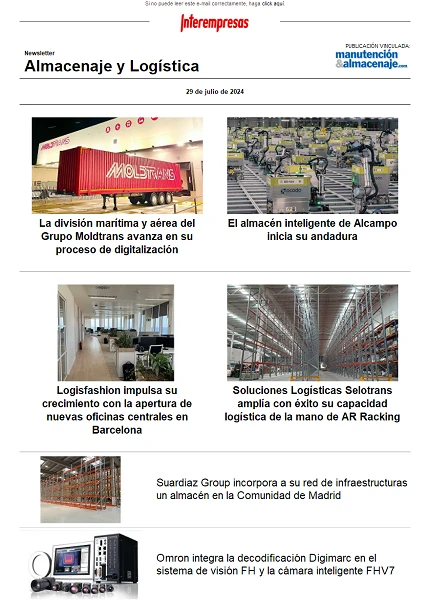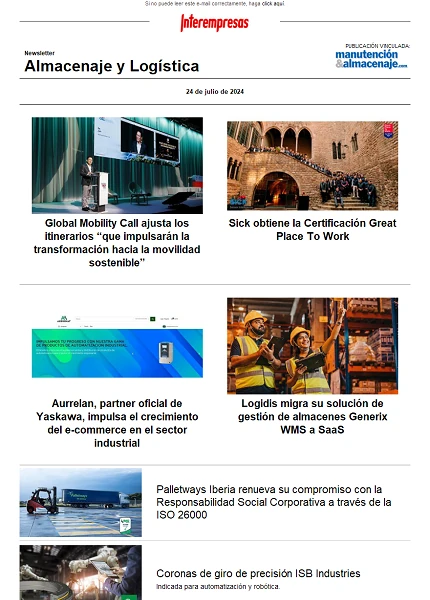"There is not more alternative: the train yes or yes"
Interview to Ignasi Ragàs, general director of Cimalsa, Logistical Centres of Catalonia
1 June 2009
Cimalsa is a public company of the Government of Catalonia commissioned of the promotion of head offices and infrastructures for the mobility and the logistical activities. His general director speaks us in this interview of the expectations of the sector, of the new needs of the logistics operators and of the future of the chain of distribution.
What have been the major changes that have come to realize the new needs of the operators in recent years in terms of logistics and what infrastructure?
In our experience, we understand that greater developments in the logistics parks has taken place in recent years in improving the quality of urbanization. They have also changed the needs of telecommunications infrastructure, logistics are increasingly more follow-up processes, and the operator requires more bandwidth.
Another element that we are observing recently is a growing evaluation of everything related to the sustainability within the logistics parks; sustainability in two ways: on the one hand, as a matter of cost savings and, on the other, insofar as the logistics operator integrates defined policies of social responsibility or sustainability in its company policy criteriato do this requires a type of elements of these features in the locations where it is implemented.
We are talking about sustainable building?
Yes, there is a growing more firms seeking characteristics of sustainable building and possibility of installing photovoltaic power generation systems.
What other advanced services are in the new parks?
For our part, in all the polygons are dealing with the issue of the services on three fronts: on the one hand, services to enterprises, on the other to the carriage, the carrier and the vehicle - gas stations, workshops, etc.. And, thirdly, services to the people, some of the most innovative would be in the nursery, a matter that a few years ago did not exist but now, with the change of habits and family roles, beginning to arise.
Is would make a 'zoning' of the Spanish territory according to the characteristics of their logistical areas.? How have different areas of the country we developed?
There are two large logistical areas in Spain. The first, and a notable distance from the other autonomous communities, is the area of Catalonia, in the stock of facilities and logistical infrastructure. Catalonia focus is 25% of all the floorspace of Spain store, which corresponds to 5.7 million square meters. There are 2 of the 5 most important ports of Spain, the second most important airport in the country, and a whole network of motorways and railway terminals of undeniable relevance. The second is the area of Madrid, as mainland distribution centre. By order of magnitude, Catalonia is followed by the autonomous community of Madrid, which has a useful surface of warehouse of 2.9 million square meters, adding the 2.1 million square metres of Castilla - La Mancha, give a total of 5 million. Behind are the Valencian Community, with three major ports, and Andalusia; These are large logistical areas of Spain, which in turn, correspond to large areas of production and consumption.
And in Europe?, what is the situation of the logistical platforms?
In Europe and, in general, in the world, what has occurred is a significant concentration of logistic operators sector in recent years, concentration that here has not taken place. Spain is still a market where there is a fragmentation of enterprises and operators very great...
Do you view negatively this lack of concentration?
The problem of the lack of concentration is that there are many small businesses. While in other industrial sectors, such as engineering, transport, etc., where Spain counts with leading companies, logistics no practically companies of European stature with ability to compete outside of Spain. In this sense it is not positive.
How can you fix the problem of the shortage of ground logistics in certain areas, as it is the case in Catalonia?
The lack or not lack of logistic space must be put in relation to the baseline situation. As I said above, 25% of Spain stores are in Catalonia, 5.7 million square meters. There is already a very large capacity and are clearly how much more capacity to have greater difficulties to grow.
In Catalonia there is a park of soil, space and very high logistical infrastructure; It would that be more, but get more is proportionally more difficult than in other territories that are based on a situation in which the initial stock is low. If we add that it is in a difficult territory, which is not flat, and with a very high population density, we find that the production floor again logistics infrastructure is more complex. But it is not impossible.
What projections do you have in production of soil in the short term?
Cimalsa has a large stock of SQM logistics in production: at the moment there are 4 million square meters; Some are already built and others in development. And we have a stock, to produce in the future, 3 million more.
There is no lack of logistical land in Catalonia, so yes there are difficulties objective to develop new logistical ground near the most densely populated areas, but overall, I think that there are logistical supply in different places in Catalonia, both ours and private, in good condition and that although now the market is stalled, when it ceases to be the sector, in Catalonia, it will grow.
The sector of logistical infrastructure for can do is a positive reading of the crisis which we live?
The, especially the housing crisis, can help that some expectations and some unrealistic approaches of real estate developments have had to adjust, and I believe that this will make the cost of the land for the logistics operator more reasonable. It can be a time in which all together reflect on how we can be more efficient and more competitive. And it is that in the past, everything was bought, but what is really competitive, efficient and forward-looking, is only now winning.
Lie ahead in the supply chain and changes in patterns of production and distribution, tending towards a more local, less global economic model?
I think that, unless Governments from falling into undesirable protectionism. There is a cost differential with countries developing or newly industrializing which is helping the population of these countries can substantially improve their income and their quality of life.
The globalization of the economy is good because it favours the development of the poor and the poor can offer conditions of production costs which we cannot offer here. And it is good that globalization allows that these countries industrialize, its population work, develop, have better expectations of life, etc.
Does and how conjugará the growth in transport with the need to reduce CO2 emissions, in short, how to make a sustainable logistics?
As I said you, I think that the changes will not mean a return to local production, and that it will be reduced to very local, own and not transposable elements, but what I do believe is that environmental issues and sustainability in logistics chains are increasingly relevant. In any case, Yes to the development of trade and transport, but in a more sustainable manner, both as a matter of compliance with the commitments of Kyoto, and because the roads in some places can hardly grow.
Are you thinking about the railroad?
Yes, we will have to bet on additional transport models; maritime, particularly marine short distance, and in fact, the railway. The design of logistics parks that we promote it have carried out so that rail freight has its role. We don't know when but there is no alternative: the train Yes or Yes. We believe that future logistics parks must be prepared so the railroad can work.





































